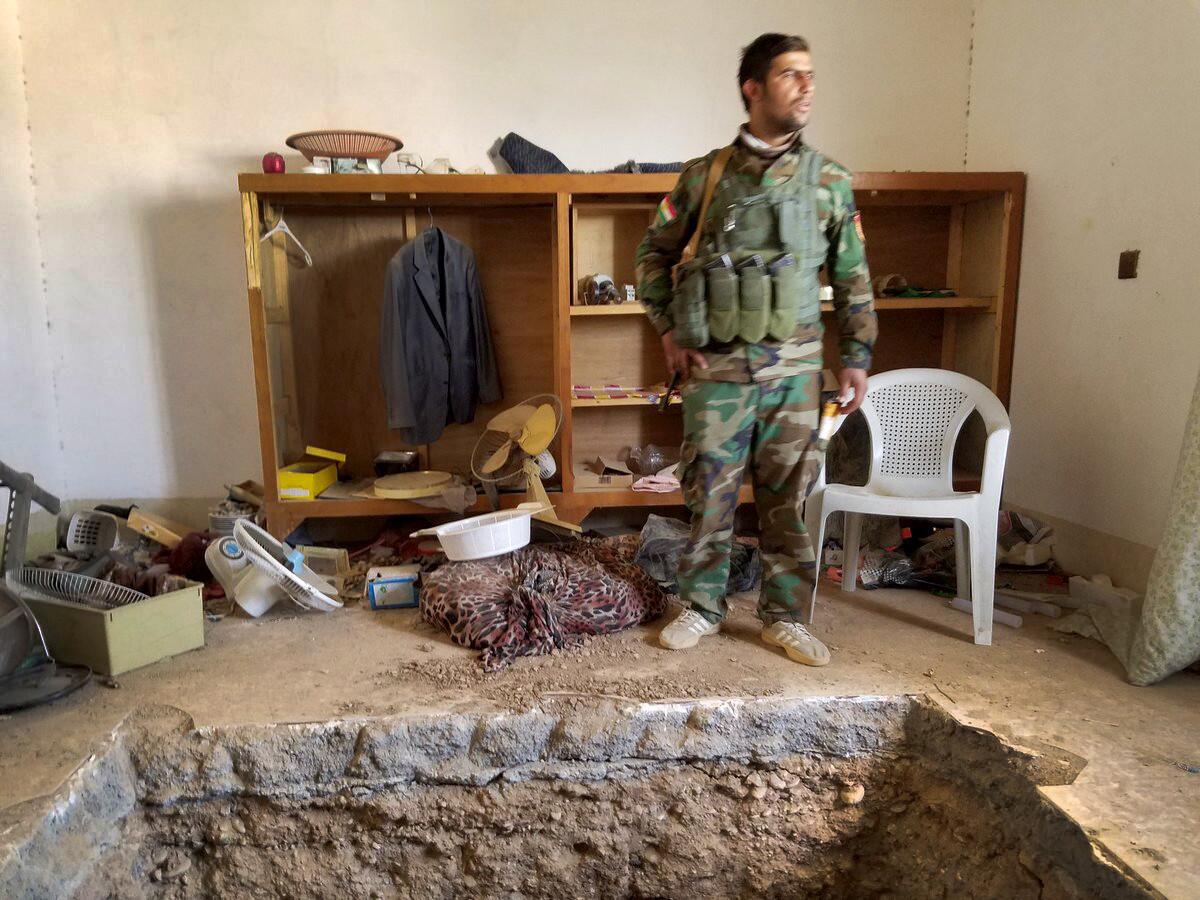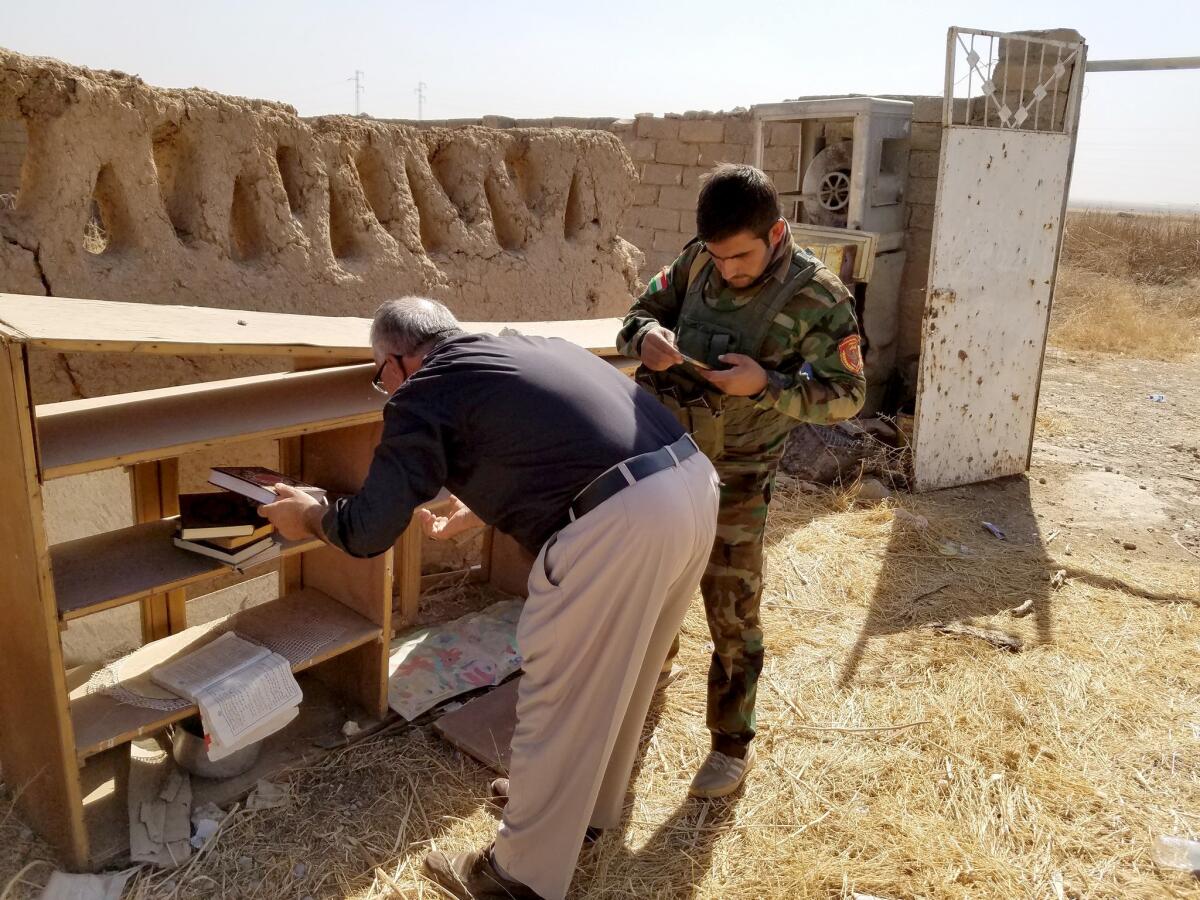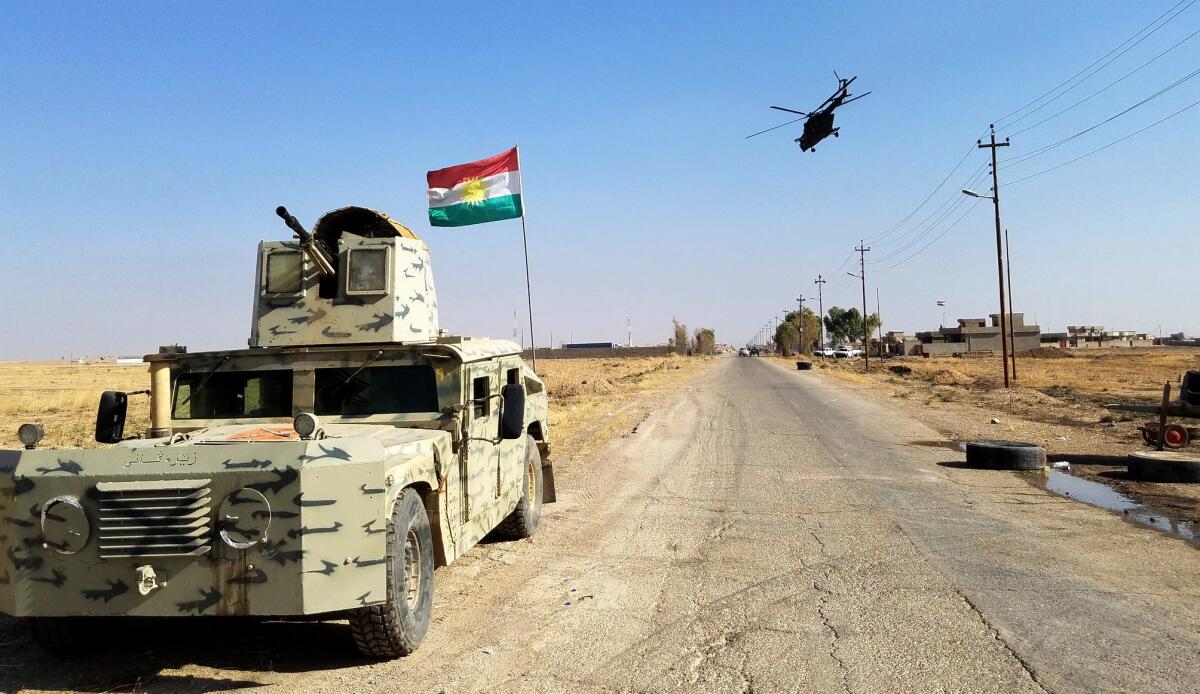Inside the underground hide-out of an Islamic State leader

Staff writer Molly Hennessy-Fiske explores a tunnel that was the hide-out of an Islamic State leader reportedly killed in Shakoli, Iraq, during this week’s Mosul offensive.
- Share via
Reporting from SHAKOLI, Iraq — A tunnel leading to the underground hide-out of an Islamic State leader killed in the Iraqi forces-led Mosul offensive was outfitted with extremist graffiti, electricity, appliances, stockpiles of food and, potentially, booby traps.
“We found some of their mortar shells over there under the tunnels,” Kurdish Brig. Gen. Fayak Hassan Rashid said Thursday from a command post in the village of Shakoli, about 20 miles east of Mosul. “You can find everything in the tunnels: They put food, mattresses, refrigerators.”
Rashid’s Kurdish forces, known as peshmerga, made the discovery after winning a battle against extremists in Shakoli on Monday. They killed more than 50 Islamic State fighters, but two peshmerga charged with clearing mines from the area died when a tunnel exploded, and two more were injured, Rashid said.
At least one house across town near another tunnel was booby-trapped, packed with explosives. Peshmerga troops said the explosives were defused Thursday.
As the offensive launched by the government Monday to drive Islamic State from its last major Iraqi stronghold advances, militants are leaving a trail of rubble and deadly traps. The destruction does not bode well for Mosul, a densely populated city of 1.2 million, where residents who fled say militants have left trenches filled with burning oil and minefields.
The rapid advance has opened a window into how Islamic State rule gripped towns across Iraq, including the takeover of homes to build tunnels and hidden living quarters.
The extremist group captured Mosul and the surrounding area in 2014. Since the offensive began Monday, 5,640 people have been displaced, according to the United Nations. Humanitarian groups expect 200,000 to be displaced in the first two weeks of the offensive, with up to a million uprooted by the time it’s over in a region where millions have already been displaced. Iraqi officials have urged civilians to shelter in place, but already several thousand have fled the Mosul area.

Bombs and artillery fire could be heard Thursday in Shakoli, near the front line of Bartella, an Assyrian town 12 miles east of Mosul. Nevertheless, some civilians were returning to villages retaken by Iraqi forces.
Many returning to Shakoli were Shiite Muslims, members of the Shabaq religious minority who faced brutal treatment at the hands of Islamic State’s Sunni Muslim fighters. The militants had piled tires in front of their houses to burn as a smokescreen, but didn’t get the chance, peshmerga commanders said. The militants wore suicide vests, but all but one who was taken prisoner were killed in a gunfight.
The Islamic State fighters had trashed many homes with mines and other explosives and packed dirt to the ceilings in some places to prevent their tunnels from being detected by drones from the air. It was unclear how soon displaced families could move back, if ever.
A network of earthen tunnels snakes beneath Shakoli and other villages surrounding Mosul, hide-outs for fighters trying to avoid U.S. coalition drones and airstrikes. In at least one case, a tunnel was cut so deep through the foundation of a house it was difficult to see the bottom.
Advancing forces in other villages have filled the tunnels to prevent militants from returning to hide. But Kurdish commanders in Shakoli said they left the tunnels open for civilians to inspect and help assure them that Islamic State fighters were gone.
The tunnel built for the Islamic State leader, or emir, in Shakoli was about 6 feet high and several feet wide, large enough to fit his grill, freezer of meat and stockpiles of rice, potatoes and fruit.

Above an opening in the tunnel, graffiti scrawled on a wall proclaimed, “There is no God but Allah the Islamic State” and was signed “The horrifying Abu Sarhan.”
Peshmerga soldier Ibrahim Hussein had been through the tunnel and believed it to be free of traps. He led the way to the emir’s windowless living quarters, wood paneled with gold-tone outlets, a clock and plenty of cushioned bedding. There was soap, cologne, medicine, lightbulbs and reading glasses.
Tucked into a gap above one wall panel was a cache of religious books, newspaper clippings about bombings and two notebooks with animal doodles and handwritten notes.
The first, a spiral pocket notebook, contained religious verses. The second, a larger notebook in which the emir had written his name, Abu Ayman Hawi Aslan, included penciled notes that appear to detail Islamic State strategy for ruling the area and conducting mortar attacks. They included measurements, computer instructions and some English, such as “GPS,” “accuracy” and “elevation.”
“We will choose the location of enemy and then we will press enter,” one Arabic note said.
Hussein, 23, tucked the notebooks into the pants pocket of his uniform. He would later deliver them to a commander who said they would prove useful in identifying Islamic State militants who they expect will try to pose as civilians to slip back into the area.
Hussein emerged from the tunnel after about 15 minutes to find a civilian examining the ruins of his nearby home. Explosions and gunfire could be heard in the distance from Bartella, where Iraqi special forces were fighting Islamic State.
This was the first time Saddam Mohammed Hussein, 42, a handyman, had seen his orange cinder-block house in two years. He fled east to Irbil when Islamic State seized Mosul and the surrounding towns.
“Half of the village residents just came to get their things and left,” he said.
About 65 families lived in Shakoli before Islamic State arrived, he said. On Thursday, there was a parade of trucks on the main road through town as residents returned and departed with rugs, furniture and satellite dishes.
“How can we live here — build a tent? We can’t live inside the houses anymore,” said Hussein’s mother, Turkieh Ismail, 65.
At the tunnel entrance under a few olive trees, Hazim Fathi Ali, 52, a driver who owns the yellow house above it, had also returned Thursday from Irbil for the first time with his wife and 16-year-old son.

As his wife picked through the ruins trying to see what could be salvaged, Ali said he could move back only if the house were razed and he received help from the government to rebuild.
“We can’t live here anymore,” he said, as his son called him over to see the graffiti and the dirt that filled their house.
Suddenly, a neighbor yelled a warning to Ali’s wife, who was about to enter a shed behind the house.
“Be careful! Don’t go further! Don’t check all parts of the house. There are mines and some booby traps,” the man called from atop a nearby wall.
She backed off.
Ali wanted to return, but felt conflicted. He tried to close the metal gate, and in the grass discovered an unexploded mortar shell. There was another on the other side of the gate. He left it open. There was nothing for anyone to take anyway.
“It’s impossible to return. But this is the place I was born. So of course I will return,” he said.
His wife gathered a pile of books the militants had left behind, which turned out to be Korans. Ali kissed them reverently before they left for Irbil. This holy book doesn’t belong to them, he said. God belongs to all of us.
Only later would a peshmerga commander mention that Islamic State militants had left a Koran in a nearby village as a trap, rigged to explode when opened.
Reached at home, Ali said that he might take the Korans to a peshmerga commander, but that they did not appear to be booby-trapped.
ALSO
U.S. service member killed by bomb blast in northern Iraq
The U.S. may be the ‘Great Satan’ in Iran, but some still want to win the U.S. visa lottery
Turkey has further complicated the Syrian war by attacking the United States’ Kurdish allies
More to Read
Sign up for Essential California
The most important California stories and recommendations in your inbox every morning.
You may occasionally receive promotional content from the Los Angeles Times.











